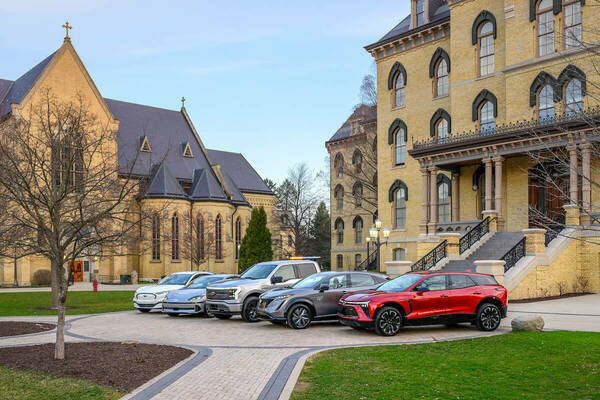
Across the country, electric vehicle (EV) adoption is rapidly becoming an investment for organizations and individuals alike looking to reduce their greenhouse gas emissions. At Notre Dame, Sustainability and Transportation Services have collaborated for the last year and a half to bring EVs to the University’s operational fleet. Through this collaboration, four new EVs have been added to the motor pool, which include a 2024 Chevy Blazer, a 2023 Hyundai Ioniq 6, a 2023 Nissan Ariya, and a 2023 Ford Mustang Mach-E. These vehicles are now available to rent for University-related business.
EV rentals fully underway
EV rentals have generated much excitement, and these new additions to the fleet have raised the attention of the campus community and visitors alike. “Donors and benefactors are excited to see that the University is purchasing electric vehicles,” Executive Driver Tony Travick says.

Transportation is the largest source of greenhouse gas emissions by economic sector in the United States, responsible for up to 28 percent of total emissions, according to the EPA. Transitioning away from traditional gasoline-powered vehicles has incredible potential for impact. Motor Pool Coordinator Donnetta McClellan is one of many staff members who are helping to carry out sustainable transportation initiatives at the University.
“Partnering with the University to become carbon neutral by adding electric vehicles to our motor pool is just one of the ways we can help reduce our carbon footprint both locally and globally,” McClellan says.
It’s not always easy being green
A transition to new technology isn’t always easy, but the University is committed to decarbonization. This includes identifying strategic opportunities to reduce greenhouse gas emissions from our operational fleet. Transportation Services Manager Cory Thompson has been the boots on the ground, working to implement this initiative for Notre Dame. He and his team are managing the new fleet, conducting research and helping to educate campus motor pool renters with the most up-to-date information about operating and maintaining electric vehicles.

“The environment is very important to me,” Thompson says. “Being able to purchase electric vehicles to have as an option for a rental vehicle is a huge win. EVs are the future to help clean up some of our environmental woes in the world. I am very privileged to work with and have the support of the ND Sustainability team for guidance and support. This team effort, and the will to get it done, will have promising results for the future of our environment.”
In addition to the environmental benefits of decarbonization, mitigating greenhouse gas emissions is critical to improving human health. While the implementation of the Clean Air Act correlates with trends of improved ozone levels, over 119 million Americans are still living in areas with significant levels of air pollution. Unhealthy levels of ozone and particle pollution can cause respiratory illnesses and exacerbate their effects, according to the American Lung Association.
“In addition to lower greenhouse gas emissions, another result of electrifying our fleet includes a reduction in tailpipe emissions. This incrementally supports improved air quality — and a healthier environment for our campus community,” Senior Director of Sustainability Geory Kurtzhals says.

As with any emerging technology, there will be challenges to overcome and many questions to answer. Whether it’s infrastructure challenges or learning new technology, the University is working to stay up-to-date with the changing EV market.
“Of course, we are only at the very beginning of this journey,” Brian Fremeau, senior director of operations, says. “Campus partnerships have been critical for us to get started on an ambitious and practical transition to electrifying the University vehicle fleet.”
Originally published by at ndworks.nd.edu on March 18, 2024.